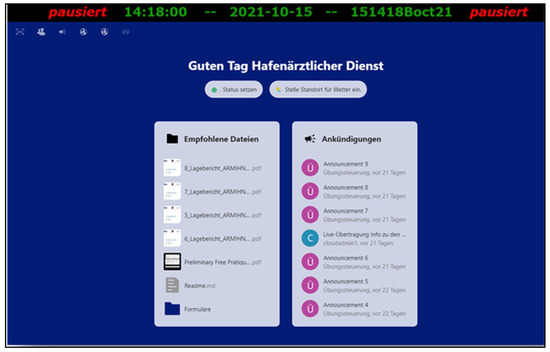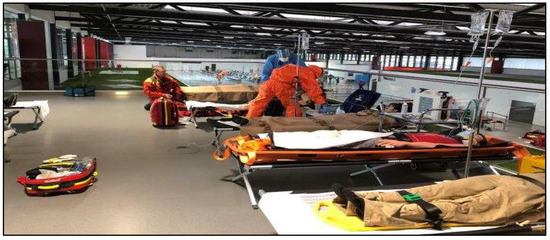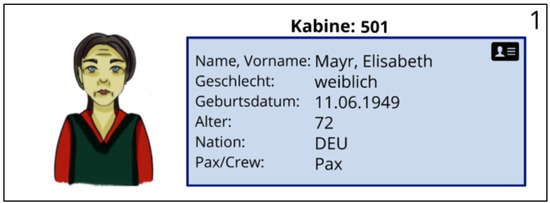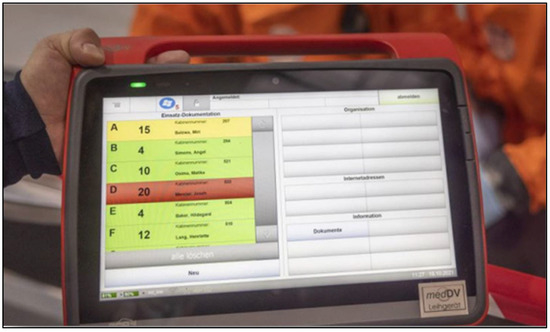Abstract
Within the framework of the interdisciplinary research project ARMIHN (Adaptive Resilience Management in the Port) a two-day large-scale exercise took place in the Port of Hamburg in October 2021. Due to the COVID-19 pandemic, the exercise could not be realized as a full-scale exercise with a large number of participants and actors as originally planned. Therefore, a hybrid exercise concept with virtual and live parts was developed. The project ARMIHN has shown that the planning, organization, and implementation of a hybrid large-scale exercise is demanding, resource- and time-intensive. On the other hand, the project showed the possibility for exercises to be conducted even when underlying conditions like the COVID-19 pandemic do not support a full-scale exercise in presence.
1. Introduction
Due to the international growth in maritime shipping and travel, the risk of serious infectious diseases spreading via this sector has increased in recent years. In confined environments, such as passenger ships, a wide variety of pathogens can spread among crew members and passengers [1].
The aim of the interdisciplinary research project ARMIHN (Adaptive Resilience Management in the Port), which was carried out in Germany between 2019 and 2021, was to improve resilience and capabilities in response to mass-casualty incidences (MCI) in the port with a high number of extremely infectious patients among rescue workers and relevant stakeholders. In the framework of the project emergency plans, a training concept and emergency exercises were developed [2].
In October 2021, a two-day large-scale exercise took place in the Port of Hamburg as part of ARMIHN. A dynamic infection event on board a cruise ship was simulated. The scenario involved a cruise ship currently on its way to Hamburg, when a high number of cases with respiratory symptoms occurred. The exercise’s objective was to prove the emergency and communication concepts developed in the ARMIHN project with the participation of all relevant stakeholders [3].
2. Material and Methods
Due to the COVID-19 pandemic, the exercise could not be realized as a full-scale exercise with a large number of participants and actors as originally planned. Therefore, a hybrid exercise concept with virtual and live parts was developed and implemented.
On the first day, all activities were carried out using the digital exercise platform, which was specifically developed for the ARMIHN exercises (Figure 1). On the second day, there was the additional presence of exercise parts in a cruise terminal in the port of Hamburg.

Figure 1.
Welcome page of the digital exercise platform (screenshot) [4].
A ship’s superstructure, including a board hospital (Figure 2) and decks with associated cabins, was simulated in the cruise terminal. Sick passengers were represented by paper-based simulators as a consequence of the necessary contact reduction (Figure 3).

Figure 2.
Simulated ship’s superstructure including a board hospital [4].

Figure 3.
Detail of a paper-based simulator [4].
On the second day of the exercise, a tablet-based triage algorithm was tested, which was developed as part of the ARMIHN project specifically for mass casualty incidents involving infected/sick people (Figure 4). Due to the digital recording of patient data on-site, it was intended to provide a fast orientation for the emergency services in assessing the severity of the illness.

Figure 4.
Tablet with triage software [4].
3. Results
Several results can be derived from the hybrid full-scale exercise carried out in the ARMIHN project.
At an operational level, the necessary preparations for the ship’s call in Hamburg were made (first day of the exercise). In addition to ensuring the necessary support for treatment and care, a triage of the patients was performed, and the necessary treatment capacities in the surrounding hospitals were prepared as well as the corresponding ambulances (second day of the exercise) [3].
The hybrid ARMIHN exercise has shown that the planning, organization, and implementation of a hybrid large-scale exercise is demanding, resource- and time-intensive. However, it offers the possibility for exercises to be conducted even when underlying conditions (in this case, the COVID-19 pandemic) do not support a full-scale exercise in presence.
The initial development or acquisition of a digital exercise platform is cost-intensive, but it is worthwhile if used repeatedly and by several users. The participants’ confidence in acting with an infectious mass casualty incident was strengthened and improved in the course of the exercise. In a questionnaire-based survey, 90% of the exercise participants rated the digital exercise platform as conducive to their growth of knowledge. A digital exercise platform offers further advantages by providing good clarity to all the stakeholders involved. All relevant information is stored in one central place, and communication can be facilitated.
4. Discussion and Conclusions
It is conceivable that other reasons or factors besides pandemic restrictions, could limit the conducting of large-scale exercises in person. A hybrid or even entirely virtual exercise might be a good alternative in such a case. It should be noted, however, that the use of new and complex technical solutions (e.g., digital exercise platforms) can quickly overwhelm users without prior intensive instruction and training.
It would be advisable to have consistent and standardized exercise concepts for these special exercise formats and to make them available to all interested parties. The joint use of a tried and tested digital exercise platform would also be worthwhile and would minimize the acquisition and operating costs for the individual user.
Various documents and templates for the management of a mass casualty incident in the port, as well as the planning and implementation of exercises, are stored on the project website [3]. An English translation of the website is planned.
Author Contributions
Conceptualization, L.E., M.B., T.v.M., M.O., V.H., J.H., S.B. and M.D.-F.; methodology, L.E.; validation, L.E. and M.D.-F.; formal analysis, L.E.; investigation, all authors; resources, B.G., S.K.-K. and E.H.; data curation, K.M.; writing—original draft preparation, L.E.; writing—review and editing, all authors.; visualization, L.E., K.-S.W. and C.S.; supervision, M.B. and M.D.-F.; project administration, L.E., M.B., J.d.B. and M.D.-F.; funding acquisition, M.D.-F., S.B. and M.O. All authors have read and agreed to the published version of the manuscript.
Funding
The research project ARMIHN was funded by the Federal Ministry of Education and Research (Germany). Grant number 13N14923-13N14925.
Institutional Review Board Statement
Not applicable.
Informed Consent Statement
Not applicable.
Data Availability Statement
Data available on www.armihn.de or on request from the authors.
Conflicts of Interest
The authors declare no conflict of interest.
References
- Kordsmeyer, A.-C.; Heidrich, J.; Belz, L.; Jensen, H.-J.; von Münster, T.; Heuser, J.; Klein, A.; Bakir, S.; Henning, H.; Ekkernkamp, A.; et al. Adaptives Resilienz-Management im Hafen (ARMIHN)–Analyse vergangener Ausbrüche von Infektionserkrankungen auf (Passagier-)Schiffen. In Proceedings of the Annual Scientific Meeting of the DGAUM, Munich, Germany, 11–14 March 2020. [Google Scholar]
- de Boer, J.; Bakir, S.; Henning, E.; Ehlers, L.; Heuser, J.; Klein, A.; Kordsmeyer, A.-C.; von Münster, T.; Oldenburg, M.; Dirksen-Fischer, M.; et al. Adaptive Resilience Management in the Port. Description of an Interdisciplinary Project. In Proceedings of the International Symposium on Maritime Health, Hamburg, Germany, 12–15 June 2019. [Google Scholar]
- Adaptives Resilienz Management im Hafen. Available online: https://armihn.de/ (accessed on 19 August 2022).
- Final Report of the Joint Project. Adaptive Resilience Management in the Port. Available online: https://armihn.de/projekt-abschlussbericht/ (accessed on 19 August 2022).
Publisher’s Note: MDPI stays neutral with regard to jurisdictional claims in published maps and institutional affiliations. |
© 2022 by the authors. Licensee MDPI, Basel, Switzerland. This article is an open access article distributed under the terms and conditions of the Creative Commons Attribution (CC BY) license (https://creativecommons.org/licenses/by/4.0/).